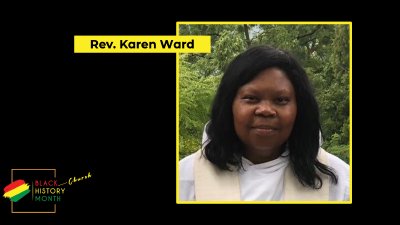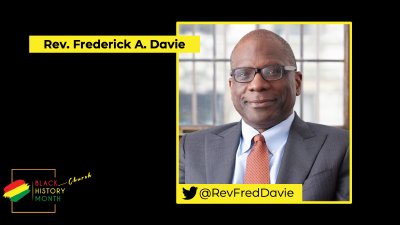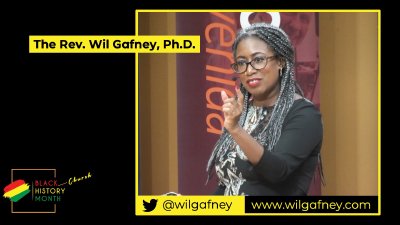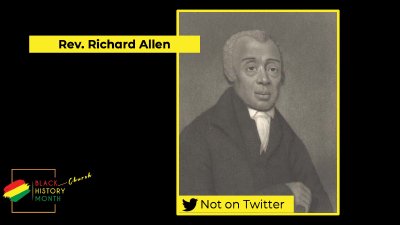

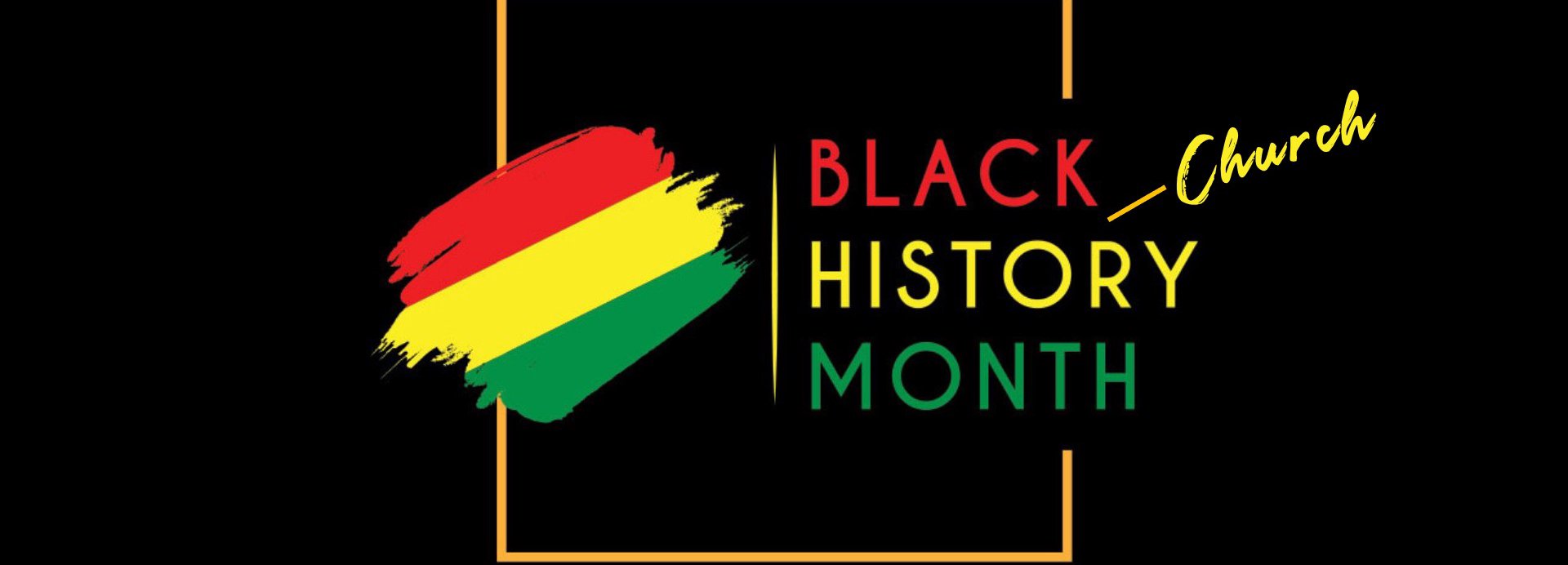
BLACK (CHURCH) HISTORY MONTH
Rev. Karen Ward
February 27, 2022 • Ryan Marsh
During the month of February Salt House celebrates Black Church history and the immeasurable contribution of our siblings of African descent, both past and present, because Black history is our history. Today I get to honor my mentor and friend, the Reverend Karen Ward. Karen is a pioneer in the Church, always venturing further into God’s mission in the world. I first met Karen in 2003 when she arrived in Seattle by way of Chicago to plant a new mission start called COTA or Church of the Apostles. She invited me to come work with her developing creative liturgies and helping to establish what would become the Fremont Abbey. Our first collaboration was to throw a big midnight easter vigil party on Capitol Hill, with live bands and DJs, labyrinths and prayer installations. She showed me an expansive vision of the Church that was wild and full of possibility. Along the way she would teach me about the radical grace of God revealed in Jesus, about the priesthood of all believers, about the human paradox of simultaneously %100 saint and sinner. She articulated a theology that I was hungering for. I remember asking her, “Where’s this theology come from?” “Oh, it’s just Lutheran Theology man.” She forgot to mention that I was now a part of the Lutheran Church – ELCA. It was not always easy for Karen. She struggled through many roadblocks in church planting and made it possible for other fresh expressions in the Northwest and the U.S., like Church of the Beloved, House For All, and even us, Salt House. She continues to push the boundaries of what church can be in Portland Oregon, and I’m grateful to be able to honor today, my mentor and friend, the Reverend Karen Ward. This is good!
Rev. Frederick A. Davie
February 20, 2022 • Zach Herzog
For today’s segment on Black Church History, I’d like to introduce you to the Rev. Frederick A Davie. Rev. Davie is an ordained Presbyterian Minister currently serving as the Senior Strategic Advisor to the President of Union Theological Seminary, where he previously worked as Vice President for over a decade. His resume as a prophetic voice is impressive all around, with a career focused on addressing police reform, climate change, and LGBTQ+ access to resources. He grew up just outside of Charlotte, North Carolina at a time that black schools were being closed and black students sent to white schools. He attended Greensboro College, where he was the first black student to be elected Student body vice-president, and later student body president. While he thought he wanted to be a physician’s assistant, he was inspired by courses in Hebrew Bible and the Prophets and decided to pursue a career in ministry. He attended seminary at Yale Divinity School, where he was the president of Yale Black Seminarians. Rev. Davie came out in 1986, and worked for the New York Presbytery where he organized a gay and lesbian caucus in the church. He later took a position on the New Your City Board of Education where he helped pass the approval of a curriculum that included teaching books with same sex couples in schools, and a comprehensive HIV task force to make condoms available in high schools. Rev. Davie has served in various political roles including advising Mayor de Blasio on police brutality, supporting Vice President Al Gore’s climate change initiatives, and most prominently, serving on President Barack Obama’s transition team. As a member of the White House Council under President Obama, he advocated for the inclusion of non-traditional families and marginalized populations in policy formation and resource allocation, especially as related to faith based organizations. Rev. Davie’s husband, Michael Adams, is the CEO of SAGE USA, another LGBTQ advocacy group that fights for the rights and protections of queer senior citizens. While Rev. Davie has frequently written and spoken on the subject of being born “black, poor and gay,” and he says, “My faith made it possible to come out and to lead a mostly healthy and productive life. God’s love as expressed in the love and acceptance of my family and friends has made all the difference.”
Rev. Wil Gafney, Ph.D.
February 6, 2022 • Sara Wolbrecht
February is Black History Month. And it’s an important for us to keep learning Black history, because Black history is all of our history, and has been largely silenced. The efforts of Black changemakers, past and present, to keep the lives, the experiences, the history of Black people front and center – amid the systemic racism in our country – are feats to be acknowledged and celebrated. Celebrated and built upon. We want to keep building on that centering work. Which is why each Sunday this month, we’ll celebrate Black History – as our history – by celebrating past and current Black change-makers who have impacted the church. So it’s a special segment of This Is Good, we’re doing Black (Church) History Month, celebrating a few of the good, good Black folks who have, who are, living this life of Jesus in profound ways that have formed the church. For our first, I’d like to introduce you to the Rev. Wil Gafney, Ph.D. If you don't yet know Rev Gafney, she's a well know biblical scholar, Episcopal Priest, and Professor of Hebrew Bible at Brite Divinity. She's also the author of several books, including ‘Womanist Midrash’ & ‘Daughters of Miriam: Women Prophets in Ancient Israel’. Rev Gafney is a womanist, which means her teaching, writing and speaking offer a language and interpretation that attends to marginalized characters in biblical narratives, especially women and girls, intentionally including and centering on non-Israelite peoples and enslaved persons. How different a perspective we get on a biblical text when we see it from the position of the marginalized, yes? We know that our language about God matters. Reverend Gaffney knows this, and as a scholar in Hebrew and Greek, the languages of the Bible, she teaches that often the feminine aspects of the Divine were repressed in the translations, but in the very grammar of the original languages, God is also our Mother and She. Feminine language and metaphors for God appear often in the Bible when we actually look at the original languages. Rev Gaffney is also featured for the month of February in the Holy Troublemakers and Unconventional Saints 2022 wall calendar. Where they offer Rev Gafney’s translation of Job 33:4: The spirit of God, she has made me, and the breath of the nursing God, she gives me life And I’ll leave you with this final quote from Rev Gafney’s book: Womanist Midrash: “No matter how misogynistic, how heavily redacted, how death-dealing, how troubled, troubling, or troublesome the text, womanists who teach and preach in the black church do not throw the whole androcentric text with its patriarchal and kyriarchal lowlights out of our stained-glass windows because of its Iron Age theology. We wrestle with it because it has been received as Scripture. Our wrestling should not be taken to mean that we affirm texts that do not affirm us.” - Womanist Midrash, Rev Wil Gafney Find Rev Wil Gafney, on Twitter (@wilgafney) or check out her website http://(www.wilgafney.com) and please purchase her books We say This Is Good, and thanks be to God, for our Black sister in Christ, Rev Wil Gafney.
Rev. Richard Allen
February 13, 2022 • Jason Bendickson
Here at Salt House, February is Black CHURCH History Month and we take time each week to celebrate past and current Black change-makers who have impacted the church, because Black Church History is our history. Jemar Tisby, in his book The Color of Compromise, describes how the first black Christians in America often met in secrecy for fear of persecution. Enslaved people had to meet in, what was called "hush arbors" which were secret places on farmlands, in the woods or swamps where they gathered for covert worship. After the Civil War black Christians formed the African Methodist Episcopal Church. Richard Allen was one of the founders. He purchased his freedom in 1786 and began preaching in various interracial Methodist churches, where black worshipers were treated as second class and segregated in seating. On a Sunday in 1792, Richard Allen and fellow black minister Absalom Jones entered St. George's Methodist Church in Philadelphia. They knelt to pray in a whites-only section of the church. Allen recounts the episode in his autobiography: We had not been long upon our knees before I heard considerable scuffling and low talking. I raised my head up and saw one of the trustees having hold of the rev. Absalom Jones, pulling him up off of his knees and saying, "You must get up now you must not kneel here or I will call for aid and force you away." Mr. Jones said, "wait until prayer is over and I will get up and trouble you no more." They pulled us up, and [all the black members of the church] walk out that day as one body." Using his own money and plot of land, Allen helped start the Bethel African Church in Philadelphia in 1794, and then the African Methodist Episcopal denomination in 1816 and served as the first bishop. We say 'this is good' for our Black brothers in Christ, Reverend Richard Allen and Reverend Absalom Jones.


